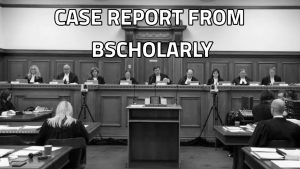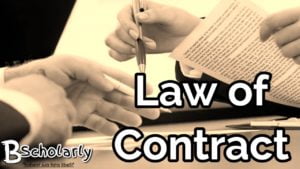Facts summary, Issues and Judgment of the court in Boulton v Jones (1857): Courts have been greeted with the opportunity of deciding cases on mistake of contract. This is one of those areas of law that has undergone a chequered history in the time past. It is not straightforward as an ordinary man may see it, for the fact that a contract was entered into under some misunderstanding or misapprehension as to some certain facts does not necessarily mean that one of the parties would be allowed to repudiate the contract at all time.

It is pertinent to know what circumstances parties to a contract will be allowed or permitted to repudiate the obligations incurred under the contract and resile out of it, on the ground that they had not known the true facts and if they had known they wouldn’t have entered into the contract. Mistake in the law of contract is never the same as mistake in the ordinary sense. It is limited in scope in the sense used in the contract than the ordinary sense.
RECOMMENDED: Facts Summary of Smith v Selwyn
Instructively, at common law it has been observed that once mistake has been proved, it renders the contract void ab initio. This means that all money paid under the agreement may be recovered since the contract under which its paid is a nullity, no corresponding consideration was furnished. If there is any property that has been transferred, the property will also be recovered by the party who mistakenly transferred the same. Thus in the much cited case of Cundy v Lindsay, it was the view of the court that there is no contract between the Respondents and Blenkarn because the Respondents intended to contract with Blenkiron and co and this was in fact known to Blenkarn.
Mistake in contract can relate to a situation where the parties thought that the subject matter of the contract exists but in fact does not exist (res extincta) or where the seller without the knowledge of both parties does not have any title to the subject matter of the contract that is to be sold (Res Sua). The principle expounded in Boulton is one of Unilateral mistake with particular to mistake as to identity. Here what the party who is seeking to revoke or rescind the contract is claiming that he did not intend to contract with the particular person he has contracted with. But since the general rule always comes with exceptions, it is not in all circumstances that a party would be allowed to void a contract simply because of mistake as to identify. It should be determined on a case by case basis and that is what we set out to do here.

RECOMMENDED: Exceptions to the rule in Combe v Combe
Facts Summary of Boulton v Jones
Boulton was recently employed in business and he took over the business of Brocklehurst, with whom he knew Jones had been used to dealing with in business. It appears that Jones was entitled to some set off in respect of sums owned to him by Brocklehurst and Boulton knew this. Jones then sent an order of goods, addressing it to Brocklehurst thinking that he is still the owner of the business.
Boulton with the knowledge of this still supplied goods to Jones without informing him that business has changed hands. When Jones learnt that the goods had not come from Brocklehurst, he refused to pay for it insisting that he did not intend to deal with Boulton. Boulton felt aggrieved and has now approached the court to determine the matter accordingly.
For more information on the facts of the case of Boulton v Jones, I highly recommend that you watch the YouTube video below:
Issue discussed
Does the argument that there was a mistake as to identity avail Jones from liability in this circumstance?
Also see: Exceptions to the rule in Rylands v Fletcher
Judgement of the court
The court answered the question in the affirmative and dismissed the suit. It first pointed out that for this principle to avail the party relying on it, it must shown that he intended to contract with some other person and not the particular party. In this case it was clear that Jones intended to contract with Brocklehurst and not Boulton.

It must be shown that this intention was known by the other party and that the identity of Brocklehurst is of crucial importance to Jones. This is because Jones intended that he should be entitled to a set off based on the previous contracts. This shows that Jones places higher importance on dealing with Brocklehurst.
The principles as expressed by the English courts in this case can rightly be placed in cases of unilateral mistakes where only one party is mistaken. It therefore appears that the test is subjective.
That is, what the party who is relying on the mistake belief and thinks. But it must be shown that there is in existence the third party whom the concerned party intended to contract with. If there was no existing third party, then the court would hardly void the contract and hold that he cannot be intending to contract with a non-existing party.
RECOMMENDED: How to answer law problem and essay questions
It was on the basis of this principle that the court in King’s Norton Metal Co ltd v Edridge Merret and Co ltd refused to void the contract for the following reasons : A metal manufacturing company had received a letter purporting to have came from “Hallam and Co” in Sheffield asking for quotations for metal wire. Wallis who was the person that actually sent the letter which has the picture of a large factory and a list of overseas depots.
When Wallis obtained the wire, he sold it to the defendants based on the fraudulent misrepresentation. When the King’s Norton wanted to claim, the claim was rejected because the defendant had acquired a good title to the subject matter. This is Because King Norton had intended to contract with the writer of the letter.
Although it would not have done so if it had known what sort of a person the writer was, and he was using an alias, a contract had been made which was not void on the grounds of mistake, but only voidable for fraud, consequently the court cannot declare such contract void. It does appear that there are no hard and fast rule here. Every case should be decided on its merits.

Edeh Samuel Chukwuemeka, ACMC, is a lawyer and a certified mediator/conciliator in Nigeria. He is also a developer with knowledge in various programming languages. Samuel is determined to leverage his skills in technology, SEO, and legal practice to revolutionize the legal profession worldwide by creating web and mobile applications that simplify legal research. Sam is also passionate about educating and providing valuable information to people.